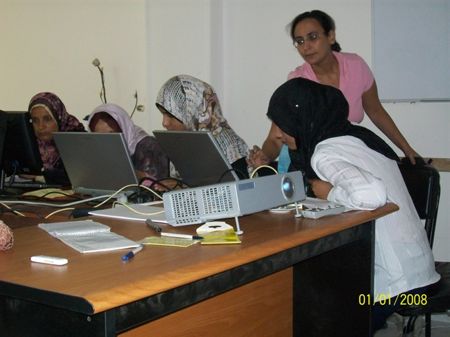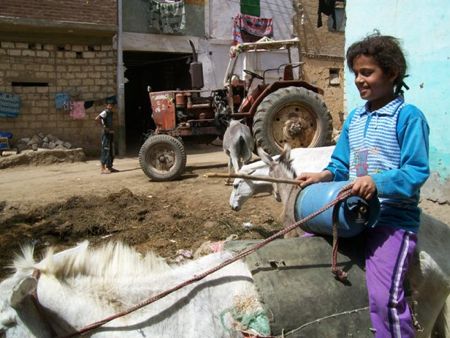The Rising Voices grantee project Women of Minya Day by Day continues as more rural women from the Dawadeyya village in Minya use citizen media to share the realities of their lives, concerns, and dreams. The project's blog Orzgyat el Saeed [ar] gives a voice for a marginalized group that we rarely hear from – women who work in the informal rural sector whether it is in agriculture or other basic rural industries. More often than not, the women work in unsafe labor conditions, while also experiencing difficult situations at home. These are some of the stories and thoughts shared by the women about the recent historical events in Egypt, as well as personal stories.
In a post titled “Girls and the Revolution,” some of the women share their thoughts on the uprising that took place in the first part of 2010 across Egypt. Salma wrote:
سالمة
انا سعيدة جدا بموقف الشعب المصرى لانة كسر حاجز الصمت ضد ا الفاسدين نعم للحرية ولا للتخريب
I am very happy with the stance that Egyptians took because we broke the barrier of silence against corruption. Yes to freedom and no to corruption!
Nadia wrote:
نادية
انا كنت بسمع اخبار كل يوم كنت بسمع فى الناس كل يوم بيموت لكن في نفس الوقت كنت فرحانه عشان في ناس بيحاولو يحمو البلد من الفساد
I was hearing news everyday about people dying, but at the same time I was happy because there were people trying to protect the country from corruption.

Blogging workshops in Minya
As the recent uprising had pushed more Egyptians to think about and discuss politics, Warda Fahmy, another woman from Dawadeyya village, shared her reflections on political participation [ar] by women living in the rural countryside:
حيث أن المرأة الريفية لا تعرف معني الحياة السياسيةلانها لا توجه اليه التوعية الكافية حتي تعرف مالها وما عليها من واجبات نحو هذا الوطن العزيز الغالي فكيف تشارك
وهي لم تقرأ ولم تكتب؟ لانه اتحرمت من حقها في التعليم .
المرأة الريفية تختلف عن المرأة في المدينة ، ففي الريف لا توجد مساواة بين الرجل والمرأة فالمرأة في الريف يقتصر علي تربية الاولاد والحقل للعمل ، اما المرأة في المدينة لها كثير من الحقوق مثل الرجل في التعليم والعمل
Since rural women don’t know what political life is because they don’t have enough awareness to know her rights and duties towards our precious country, how can she participate if she doesn’t read or write because she was deprived from her right to education? […] Rural women are different from urban women. In rural areas, there’s no equality between men and women; women’s role is limited to raising children and working in the field. However, urban women have more rights like men in education and work.

Rural life in Dawadeyya village
Others used the digital blogging platform to discuss more personal and sensitive issues. A girl anonymously shared her painful experience in a post titled “My Experience with Female Genital Mutilation (FGM) [ar],” who wrote:
انا كنت بسمع عن تجربة ختان الاناث وكنت بسمع عن بنات كانت بتضر منه، وفي يوم سمعت امي وهيا بتتفق مع الداية اللي هتختني وحاولت اقول بأعلى صوت حرام يا امي، انا مش عايزة اتختن انا بخاف
حاولت اقول بأعلى صوت حرام عليكم، دا مفيش في القرآن ولا الانجيل حاجة بتقول كدا .
اما انا فمضايقة اني اتختنت، وانا مكنتش عايزة دا، ولو الحكم في ايدي لما يبقى عندي بنات مش هختنهم
I used to hear about FGM and about girls getting harmed by it. One day I heard my mother making an agreement with the midwife that would perform it. I tried to say with my loudest voice, “No mother! I don't want that to happen, I am scared […] I tried to say this is haram (religiously forbidden). Nothing in the Koran or the Bible says so […] I am sad that I was circumcised. I didn't want this. If I have the power when I have daughters I wouldn't do that to them.
In another post tackling reproductive health and stigma entitled “Problems with Infertility [ar],” the women shared the following thoughts:
في مشكلة العقم وعدم الانجاب في بلدنا ، اذا كان الرجل لا يستطيع الانجاب تعيش معه المرأة وتتحمل دون ان تحسسه بعجزه او نقصه، اما اذا كانت هي التي لا تنجب ، يتزوج بغيرها ولا يهتم بالعيش معها، وحتي ان اراد الاستمرار في حياته معها، يتدخل الاهل فيبدأ الامر بمعيرتها ونشر خبر عقمها، ثم المطالبة له بان يتزوج بأخري .
اما اذا حدث الطلاق فلا تتجوز هي من بعده لان خلاص البلد كلها عرفت انها مش ممكن تخلف
There is a problem with infertility in our village. If the man can’t have children, the wife sticks with him and carries on without making him feel defective. But if she’s the one who can’t give birth, he marries another woman and doesn’t care about living with his wife. Even if they continue the marriage, the family interferes and they begin to defame her and spread the news about her infertility, and then demands the husband to marry another woman. […] If the woman gets divorced, she doesn’t get married again because the whole village knows that she can’t have babies.





